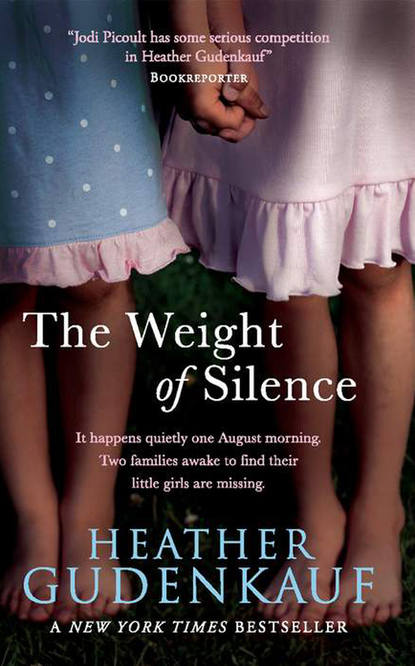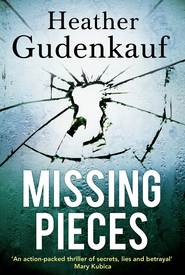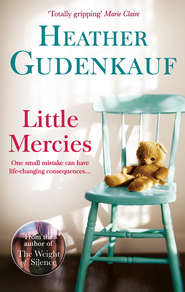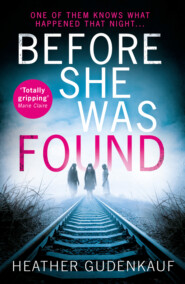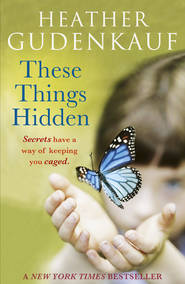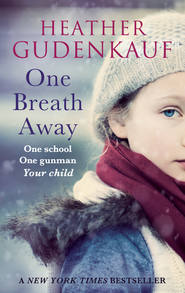По всем вопросам обращайтесь на: info@litportal.ru
(©) 2003-2025.
✖
The Weight of Silence
Автор
Год написания книги
2018
Настройки чтения
Размер шрифта
Высота строк
Поля
In kindergarten, Miss Monroe, her energetic, first-year teacher whose straight brown hair and booming bass voice belied her pretty sorority girl looks, thought that Calli was just shy. Calli’s name didn’t come up to the Solution-Focus Education Team until December of Calli’s kindergarten year. And that didn’t occur until the school nurse, Mrs. White, after handing Calli a clean pair of socks, underwear and sweatpants for the second time in one week, discovered an unsettling pattern in Calli’s visits to the health office.
“Didn’t you tell anyone you needed to use the restroom, Calli?” Mrs. White asked in her low, kind voice.
No response, just Calli’s usual wide-eyed, flat expression gazing back at her.
“Go on into the restroom and change your clothes, Calli,” the nurse instructed. “Make sure to wash yourself the best that you can.” Flipping through her meticulous log documenting the date and time of each child’s visit to the health office, the ailment noted in her small, tight script—sore throats, bellyaches, scratches, bee stings. Calli’s name was notated nine times since August 29, the first day of school. Next to each entry the initials UA—for Urinary Accident. Mrs. White turned to Miss Monroe, who had escorted Calli to the office.
“Michelle, this is Calli’s ninth bathroom accident this school year.” Mrs. White paused, allowing Miss Monroe to respond. Silence. “Does she go when the other kids do?”
“I don’t know,” Miss Monroe replied, her voice tumbling under the bathroom door to where Calli was stepping out of her soiled clothing. “I’m not sure. She gets plenty of chances to go…and she can always ask.”
“Well, I’m going to call her mom and recommend that she take Calli to the doctor, see if all this isn’t just a bladder infection or something else,” Mrs. White responded in her cool, efficient manner that few questioned. “Meanwhile, let her use the restroom whenever she wants, send her in anyway, even if she doesn’t need to.”
“Okay, but she can always ask.” Miss Monroe turned and retreated.
Calli silently stepped from the office restroom garbed in a dry pair of pink sweatpants that pooled around her feet and sagged at her rear. In one hand she held a plastic grocery sack that contained her soaked Strawberry Shortcake underwear, jeans, socks and pink-and-white tennis shoes. The index finger of her other hand absently twirled her chestnut-colored hair.
Mrs. White bent down to Calli’s eye level. “Do you have gym shoes to put on, Calli?”
Calli looked down at her toes, now clad in dingy, office-issued athletic socks so worn she could see the peachy flesh of her big toe and the Vamp Red nail polish her mother had dabbed on each pearly toenail the night before.
“Calli,” Mrs. White repeated, “do you have gym shoes to put on?”
Calli regarded Mrs. White, pursed her thin lips together and nodded her head.
“Okay, Calli,” Mrs. White’s voice took on a tender tone. “Go put on your shoes and put the bag in your book bag. I’m going to call your mother. Now, you’re not in trouble. I see you’ve had several accidents this year. I just want your mom to be aware, okay?”
Mrs. White carefully searched Calli’s winter-kissed face. Calli’s attention was then drawn to the vision eye chart and its ever-shrinking letters on the wall of the institutional-white health office.
After the Solution-Focus Team of educators met and tested Calli and reviewed the data, there appeared to be nothing physically wrong with her. Options were discussed and debated, and after several weeks it was decided to teach her the American Sign Language sign for bathroom and other key words, have her meet weekly with the school counselor, and patiently wait for Calli to speak. They continued to wait.
Calli climbed out of bed, carefully picked up each of her new school supplies and laid out the items on her small pine desk as she planned to in her new desk in her classroom on the first day of second grade. Big things on the bottom, small things on top, pencils and pens stowed neatly away in her new green pencil case.
The need to urinate became an ache, and she considered relieving herself in her white plastic trash can beside her desk, but knew she would not be able to clean it without her mother or Ben noticing. If her mother found a pool of pee in her wastebasket, Calli knew she would fret endlessly as to what was going on inside her head. Never-ending yes-no questions would follow. Was someone in the bathroom and you couldn’t wait? Were you playing a game with Petra? Are you mad at me, Calli? She also considered climbing out her second-story window down the trellis, now tangled with white moonflowers as big as her hand. She discounted this idea, as well. She wasn’t sure how to remove the screen, and if her mother caught her midclimb she would be of a mind to nail Calli’s window shut and Calli loved having her window open at night. On rainy evenings Calli would press her nose to the screen, feel the bounce of raindrops against her cheeks, and smell the dusty sunburned grass as it swallowed the newly fallen rain. Calli did not want her mother to worry more than she did not want to have her father’s attention drawn to her as she made her way down the stairs to use the bathroom.
Calli slowly opened her bedroom door and peeked around the door. She stepped cautiously out of her room and into the short hallway where it was darker, the air staler and weightier. Directly across from Calli’s room was Ben’s room, a twin of her own, whose window faced the backyard and Willow Creek Woods. Ben’s door was shut, as was her parents’ bedroom door. Calli paused at the top of the steps, straining to hear her father’s movements. Silence. Maybe he had left for his fishing trip already. Calli was hopeful. Her father was leaving with his friend Roger to go fishing at the far eastern edge of the county, along the Mississippi River, some eighty miles away. Roger was picking him up that morning and they would be gone for three days. Calli felt a twinge of guilt in wishing her father away, but life was so much more peaceful with just the three of them.
Each morning that he was sitting in the kitchen brought a different man to them. Some days he was happy, and he would set her on his lap and rub his scratchy red whiskers on her cheek to make her smile. He would kiss Mom and hand her a cup of coffee and he would invite Ben to go into town with him. On these days her daddy would talk in endless streams, his voice light and full of something close to tenderness. Some days he would be at the scarred kitchen table with his forehead in his hands, empty beer cans tossed carelessly in the sink and on the brown-speckled laminate countertops. On these days Calli would tiptoe through the kitchen and quietly close the screen door behind her and then dash into the Willow Creek Woods to play along the creek bed or on the limbs of fallen trees. Periodically, Calli would return to the edge of their meadow to see if her father’s truck had gone. If it was missing, Calli would return home where the beer cans had been removed and the yeasty, sweaty smell of her father’s binge had been scrubbed away. If the truck remained, Calli would retreat to the woods until hunger or the day’s heat forced her home.
More silence. Encouraged that he was gone, Calli descended the stairs, carefully stepping over the fourth step that creaked. The bulb from above the kitchen stove cast a ghostly light that spilled onto the bottom of the stairs. She just needed to take two large steps past the kitchen entry and she would be at the bathroom. Calli, at the bottom step, her toes curled over the edge, squeezed the hardwood tightly, pulled her nightgown to above her knees to make possible a bigger step. One step, a furtive glance into the kitchen. No one there. Another step, past the kitchen, her hand on the cool metal doorknob of the bathroom, twisting.
“Calli!” a gruff whisper called out. Callie stilled. “Calli! Come out here!”
Calli’s hand dropped from the doorknob and she turned to follow the low sound of her father’s voice. The kitchen was empty, but the screen door was open, and she saw the outline of his wide shoulders in the dim early morning. He was sitting on the low concrete step outside, a fog of cigarette smoke and hot coffee intermingling and rising above his head.
“Come out here, Calli-girl. What’cha doing up so early?” he asked, not unkindly. Calli pushed open the screen door, careful not to run the door into his back; she squeezed through the opening and stood next to her father.
“Why ya up, Calli, bad dream?” Griff looked up at her from where he was sitting, a look of genuine concern on his face.
She shook her head no and made the sign for bathroom, the need for which had momentarily fled.
“What’s that? Can’t hear ya.” He laughed. “Speak a little louder. Oh, yeah, you don’t talk.” And at that moment his face shifted into a sneer. “You gotta use the sign language.” He abruptly stood and twisted his hands and arms in a grotesque mockery of Calli. “Can’t talk like a normal kid, got be all dumb like some kind of retard!” Griff’s voice was rising.
Calli’s eyes slid to the ground where a dozen or so crushed beer cans littered the ground and the need to pee returned full force. She glanced up to her mother’s bedroom window; the curtains still, no comforting face looked down on her.
“Can’t talk, huh? Bullshit! You talked before. You used to say, ‘Daddy, Daddy,’ ‘specially when you wanted something. Now I got a stupid retard for a daughter. Probably you’re not even mine. You got that deputy sheriff’s eyes.” He bent down, his gray-green eyes peered into hers and she squeezed them tightly shut.
In the distance she heard tires on gravel, the sharp crunch and pop of someone approaching. Roger. Calli opened her eyes as Roger’s four-wheel-drive truck came down the lane and pulled up next to them.
“Hey, there. Mornin’, you two. How are you doing, Miss Calli?” Roger tipped his chin to Calli, not really looking at her, not expecting a response. “Ready to go fishing, Griff?”
Roger Hogan was Griff’s best friend from high school. He was short and wide, his great stomach spilling over his pants. A foreman at the local meat packing plant, he begged Griff every time he came home from the pipeline to stay home for good. He could get Griff in at the factory, too. “It’d be just like old times,” he’d add.
“Morning, Rog,” Griff remarked, his voice cheerful, his eyes mean slits. “I’m goin’ to have you drive on ahead without me, Roger. Calli had a bad dream. I’m just going to sit here with her awhile until she feels better, make sure she gets off to sleep again.”
“Aw, Griff,” whined Roger. “Can’t her mother do that? We’ve been planning this for months.”
“No, no. A girl needs her daddy, don’t she, Calli? A daddy she can rely on to help her through those tough times. Her daddy should be there for her, don’t you think, Rog? So Calli’s gonna spend some time with her good ol’ daddy, whether she wants to or not. But you want to, don’t you, Calli?”
Calli’s stomach wrenched tighter with each of her father’s utterances of the word daddy. She longed to run into the house and wake up her mother, but while Griff spewed hate from his mouth toward Calli when he’d been drinking, he’d never actually really hurt her. Ben, yes. Mom, yes. Not Calli.
“I’ll just throw my stuff in your truck, Rog, and meet up with you at the cabin this afternoon. There’ll be plenty of good fishing tonight, and I’ll pick up some more beer for us on the way.” Griff picked up his green duffel and tossed it into the back of the truck. More carefully he laid his fishing gear, poles and tackle into the bed of the truck. “I’ll see ya soon, Roger.”
“Okay, I’ll see you later then. You sure you can find the way?”
“Yeah, yeah, don’t worry. I’ll be there. You can get a head start on catching those fish. You’re gonna need it, ‘cause I’m going to whip your butt!”
“We’ll just see about that!” Roger guffawed and squealed away.
Griff made his way back to where Calli was standing, her arms wrapped around herself despite the heat.
“Now how about a little bit of daddy time, Calli? The deputy sheriff don’t live too far from here, now, does he? Just through the woods there, huh?” Her father grabbed her by the arm and her bladder released, sending a steady stream of urine down her leg as he pulled her toward the woods.
PETRA
I can’t sleep, again. It’s too hot, my necklace is sticking to my neck. I’m sitting on the floor in front of the electric fan, and the cool air feels good against my face. Very quiet I am talking into the fan so I can hear the buzzy, low voice it blows back at me. “I am Petra, Princess of the World,” I say. I hear something outside my window and for a minute I am scared and want to go wake up Mom and Dad. I crawl across my carpet on my hands, the rug rubbing against my knees all rough. I peek out the window and in the dark I think I see someone looking up at me, big and scary. Then I see something smaller at his side. Oh, I’m not scared anymore. I know them. I think, “Wait, I’m coming, too!” For a second I think I shouldn’t go. But there is a grown-up out there, too. Mom and Dad can’t get mad at me if there’s a grown-up. I pull on my tennis shoes and sneak out of my room. I’ll just go say hi, and come right back in.
CALLI
Calli and her father had been walking for a while now, but Calli knew exactly where they were and where they were not within the sprawling woods. They were near Beggar’s Bluff Trail, where pink-tipped turtleheads grew in among the ferns and rushes and where Calli would often see sleek, beautiful horses carrying their owners gracefully through the forest. Calli wished that a cinnamon-colored mare or a black-splotched Appaloosa would crash from the trees, startling her father back to his senses. But it was Thursday and Calli rarely encountered another person on the trails near her home during the week. There was a slight chance that they would run into a park ranger, but the rangers had over thirty miles of trails to monitor and maintain. Calli knew she was on her own and resigned herself to being dragged through the forest with her father. They were nowhere near Deputy Sheriff Louis’s home. Calli could not decide whether this was a good thing or not. Bad because her father showed no indication of giving up his search and Calli’s bare feet were scratched from being pulled across rocky, uneven paths. Good because if they ever did get to Deputy Louis’s home her father would say unforgivable things and then Louis would, in his calm low voice, try to quiet him and then call Calli’s mother. His wife would be standing in the doorway behind him, her arms crossed, eyes darting furtively around to see who was watching the spectacle.
Her father did not look well. His face was white, the color of bloodroot, the delicate early spring flower that her mother showed to her on their walks in the woods, his coppery hair the color of the red sap from its broken roots. Periodically stumbling over an exposed root, he continued to clutch Calli’s arm, all the time muttering under his breath. Calli was biding her time, waiting for the perfect moment to bolt, to run back home to her mother.
They were approaching a clearing named Willow Wallow. Arranged in a perfect half-moon adjacent to the creek was an arc of seven weeping willows. It was said that the seven willows were brought to the area by a French settler, a friend of Napoleon Bonaparte, the willows a gift from the great general, the wispy trees being his favorite.
Calli’s mother was the kind of mother who would climb trees with her children and sit among the branches, telling them stories about her great-great-grandparents who immigrated to the United States from Czechoslovakia in the 1800s. She would pack the three of them a lunch of peanut butter fluff sandwiches and apples and they would walk down to Willow Creek. They would hop across the slick, moss-covered rocks that dotted the width of the creek. Antonia would lay an old blanket under the long, lacy branches of a willow tree and they would crawl into its shade, ropy tendrils surrounding them like a cloak. There the willows would become huts on a deserted island; Ben, back when he had time for them, was the brave sailor; Calli, his dependable first mate; Antonia, the pirate chasing them, calling out with a bad cockney accent. “Ya landlubbers, surrender an’ ya won’ haf to walk da plank!”
“Never!” Ben yelled back. “You’ll have to feed us to the sharks before we surrender to the likes of you, Barnacle Bart!”





